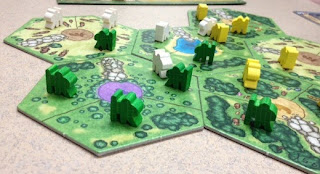A game that I heard very good things about (as well as being named after a game that I love) is Power Grid: First Sparks.
First Sparks is the Stone Age themed prequel to Power Grid, and was printed for the 10 year anniversary of the original game. In First Sparks, each round consists of four phases: buying new technologies & tools, going hunting and feeding the clan, spreading the clan, and upkeep (changing turn order, refill resources, etc). (If you are familiar with the original Power Grid, then much of this may sound familiar to you.) At the end of a round in which one player has at least thirteen members of his clan, the game will end, and the player with the largest overall clan will be the winner!
Ok - if all you're interested in is what is different between this game and Power Grid, then this paragraph is for you. First off, First Sparks is shorter. The main reason for that is that purchases are no longer based on auctioning. Instead, each card has a fixed price. Whoever is the first player will select a card that he would like to purchase. However, before he gets the opportunity, all other players (in reverse order) get the opportunity to purchase the card first (with each player only getting to buy one card per turn). The next change is that your cards generate a variable amount of food (which is like power and money all rolled into one). Instead of each tool (power plant) generating a set amount of power, each card collects a certain amount of food based on how much is available on the board. So, better cards collect additional food even when the board does not have much stockpiled, whereas cheaper cards do not collect extra food unless there is a major surplus on the board. Third, in First Sparks, meeples are essentially cities. They are the end of game trigger, and also how you win. Instead of powering them, you have to "feed" them, by spending one food per meeple every turn. Also, you need to place your meeples adjacent to any type of food that you intend to collect. The final thing that comes to mind is that there are only two "phases" of the market, and you can place meeples adjacent to other players' meeples at any point during the game. So, overall, it is very similar but is a bit simplified/streamlined.
 |
| Spreading the clan! |
The second pro that I have for Power Grid: First Sparks is that I like that the game has both tools and technology cards. I also like that you are limited on your tools, but you are not limited on your technology. This is important because you would never purchase technologies if you had an overall limit of three cards at a time. Yet, since technology does not count against your limit, it makes for interesting decisions about whether it is more valuable to upgrade your tools or if it is better to purchase a technology (which will give you long term benefits, but probably much smaller immediate returns).
 |
| Different technologies to choose from |
Now that I've covered some of the most significant pros for Power Grid: First Sparks, let's cover the cons. First, I found that, though the game is a streamlined version of Power Grid, there can still be a tendency for the game to stall due to player decision making. (Yes, I am fully aware that this is highly dependent on what players participate in your games.) The specific thing I have noticed in First Sparks is that the decision of whether a tool is "worth it" is less straightforward in First Sparks. In Power Grid, it was really easy to compare power plants - how much does each one generate, and roughly how much will it cost to power. However, in First Sparks, since each tool collects additional resources at different times, it takes longer to "see" what will happen. For example, if I am trying to determine whether a tool that collects two mammoths when there are four or more on the table is worth purchasing to replace a tool that only collects a second mammoth when there are at least eight on the table, I need to see how many mammoths will be on the board when it is my turn to collect. And, to do this you must essentially play out everyone else's turn in your head - one collects an extra if there are six mammoths, another if there are seven, etc - and so you have to calculate the entire collection process to see which of those bonuses will collect extra and which will not, thus allowing you to know how many mammoths will be on the board when you finally get to hunt.
 | |
| Do you see a baboon here, too? |
My final con for First Sparks is that there are several instances of minor nuisances in the game and rules. For example, there is a card called "Speach" (which my spell check is actively trying to get me to change). Another example is that one of the captions talks about a hunting area with "beeries." Additionally, some of the phases of the game aren't terribly clear the first time that you read through them in the rulebook. Even with familiarity of the original game of Power Grid, there were a few sections of the rules that I had to read multiple times before understanding.
Overall, I give Power Grid: First Sparks a 7.5/10. Overall, it is a good game, but I prefer the original game of Power Grid, and I'm not sure when I would choose to play this version instead.
If Power Grid: First Sparks sounds interesting, you might also check out Kingdom of Solomon, Yspahan, and Zong Shi.

Thanks for the review, I was curious how this one compared to the original.
ReplyDelete